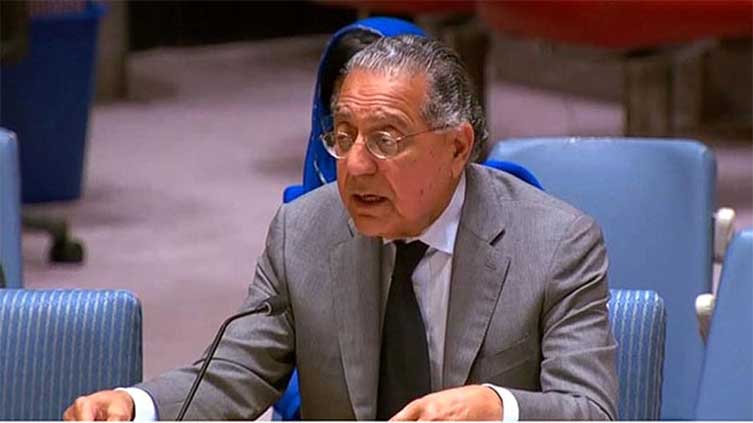In a strong plea for justice, Pakistan has called upon the United Nations Security Council to ensure the implementation of resolutions concerning the Middle East conflict, safeguarding the right of self-determination for the Palestinian people. Ambassador Munir Akram, the Pakistani envoy, condemned the recent Israeli military operations in Jenin and demanded accountability for the grave human rights violations and crimes committed in occupied Palestine. Emphasizing the need for universal and consistent application of the rule of law, Ambassador Akram urged an end to the cycle of violence and impunity that Israel has enjoyed for decades.
Pakistan’s Call for UN Action
Amid the ongoing crisis in the occupied Palestinian territories, Ambassador Munir Akram addressed the UN Security Council, urging the international community to take concrete actions against Israel’s continuous aggression. The envoy stressed the paramount importance of implementing UN resolutions that recognize the Palestinians’ right to self-determination, emphasizing that the rule of law must be applied universally and without double standards.
Impunity Fuels the Cycle of Violence
Drawing attention to the recent Israeli military operations in Jenin, Ambassador Akram expressed regret that the UN Security Council has been unable to effectively fulfill its responsibility to maintain international peace and security in occupied Palestine. He referred to the erga-omnes character of the right to self-determination, calling upon all states to ensure the immediate cessation of any obstacles hindering the exercise of this right by the Palestinian people. The envoy also cited the United Nations Human Rights Council’s special rapporteurs, who considered the attacks on the Jenin refugee camp as possible war crimes under international law, emphasizing the urgent need to hold Israel accountable.
Pursuit of Peace and Justice in the Holy Land
Ambassador Akram strongly condemned Israel’s illegal settlement development in the occupied territories, adding that such acts violate both UN Security Council resolutions and international humanitarian law. He argued that the international community cannot accept Israel’s efforts to impose a fait accompli, which perpetuates the occupation and undermines Palestinian nationhood. The ambassador underlined that the only way to achieve long-term peace in the area is for Palestine to form an independent, viable, and contiguous state based on pre-1967 boundaries, with Al-Quds Al-Sharif as its capital.
Transitioning to the current situation in the region, Khaled Khiari, Assistant Secretary-General for Middle East, Asia, and the Pacific, reported alarming figures of casualties and injuries in the occupied West Bank. He highlighted the escalating violence and unilateral measures, endangering the prospects of a two-state solution and exacerbating the economic challenges faced by Palestinians and the Palestinian Authority.
Ambassador Riyad Mansour, the Permanent Observer for the State of Palestine, called for a realistic action plan with adequate resources to address the settler-colonial nature of the Israeli occupation. He emphasized the importance of ICC investigations in delivering justice for victims and deterring perpetrators, while the International Court of Justice advisory opinion could provide crucial guidance on legal obligations for the UN and all states involved.
In conclusion, Pakistan’s call for accountability and justice in occupied Palestine resonates with the international community, urging prompt action from the United Nations to ensure the application of the rule of law without exceptions or double standards. The world watches with anticipation as the pursuit of peace and justice in the Holy Land remains an ongoing and critical challenge for global stability and security.















